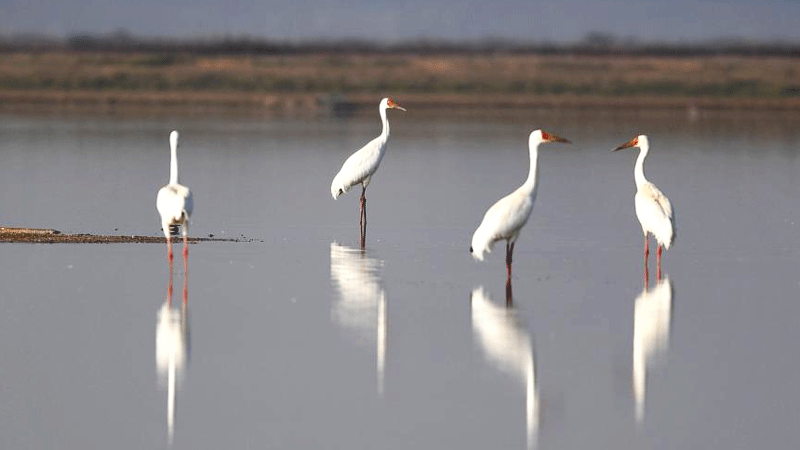Three years' fight paves way for reopening
Earlier this month, China announced that it was discontinuing its strict dynamic zero-COVID policy to contain the spread of the novel coronavirus. Many people, using 20-20 hindsight, tried to second guess the decision. Many "Monday morning quarterbacks" asked why China didn't open up earlier and why it would risk putting its economy in a temporary medically induced coma? The answer is: at its core, the mission of the Communist Party of China is to serve the people.
For almost three years China's strict pandemic prevention and control model worked remarkably well. Most governments, however, with a wide spectrum of competence, or lack of it, threw up their hands and/or tilted in favor of boosting their economy at the expense of human lives. They were worried more about money than about the people. They prematurely succumbed to their populations' pandemic fatigue, thereby throwing caution and sound medical practices to the wind, needlessly losing precious lives.
While the next few months in China and elsewhere can't be predicted, experts say that globally, new variants and sub-variants of the novel coronavirus, and the emergence of new coronaviruses are a matter of when, not if, and that some could be more transmissible and deadly. Instead of fighting needless zero-sum international relations battles, it's imperative that global attention and energy be laser-focused now on learning from the past three years' experience and preventing future pandemics.
To me, statistics give a clear answer as to why China was right to wait until now. The best source of information to analyze the consequences of COVID-19 is from the UN's World Health Organization. Because of the nature of COVID-19 with many patients having comorbidity, almost invariably, the number of cases and deaths everywhere is understated. Still, the numbers give us a reasonable idea about real-world conditions. Globally, there have been 647,972,911 cases and 6,642,832 deaths reported as of last Friday on the WHO Coronavirus Dashboard.
Previous US president Donald Trump is infamous for following the policy of "America first", but sadly for him and for the United States as a whole, the place in which he's left one of his biggest black marks is COVID-19 cases and deaths.
According to the latest weekly report of the WHO, there have been 98,525,870 confirmed cases of COVID-19 with 1,077,129 deaths in the US from Jan 3, 2020 to Dec 16, 2022. Second in number of cases is India with 44,675,609 cases, and second in number of deaths is Brazil with 691,449. Compared with China's confirmed 10,008,444 cases with 5,235 deaths.
I've been living in Vienna, Austria, for more than 1,000 days with my wife and daughter, often self-isolating at home. All three of us had COVID-19 in November. My daughter, who recently returned from China with two Chinese vaccine doses, had the mildest symptoms. My wife and I with eight Western vaccines between us had what was like a mild flu. It was so different from what we feared at the beginning of the pandemic here before earlier variants gave way to the milder Omicron — the same as in China.
The Austrian government did well with vaccines and mask requirements but basically gave up these requirements months ago because many people in Austria were fatigued by anti-pandemic restrictions, and resisted mask-wearing mandates. Even in Vienna, where, unlike the rest of the Alpine nation, masks are still required on public transport, many people either don't wear one or hang them around their neck. As a result, there are many COVID-19 cases but few deaths.
Although I feel quite safe at the moment, I worry that some new variants or new viruses may emerge, making the three pandemic years look like child's play. We humans don't seem to get the message that we should learn from experience. As the great Spanish-American philosopher George Santayana said, those who cannot remember the past are condemned to repeat it.
While in the past three trying years, countries might have dodged a bullet or two, the nearly 7 million people who died didn't. International efforts such as COVAX didn't turn out to work that well. Once again, the Global South suffered as the developed world outbid it and grabbed more global vaccines available than it needed, a lot of them unused and discarded. Don't we ever learn?
Mutations are an organism's attempt to survive. The virus has been doing just that. New mutations are being reported such as BF.7 in Europe, Asia, the Indian subcontinent and elsewhere which seem to be more infectious and more capable of circumventing existing vaccines. While promising research is ongoing to develop vaccines against all coronaviruses, much work remains to be done.
Even more troubling is the fact that animal viruses that haven't jumped to humans could do so in the near term. Scientists have identified 958 viruses in 30 countries, including a new Ebola virus and more than 100 coronaviruses, which have a high potential to do just that.
So instead of all the zero-sum chest-thumping going on across the world, especially between China, Europe and the United States, it's time to work together in order to better protect our national interests, and align our broad development goals in order to ensure pandemics in the future do not cause millions of deaths, or better still, disease outbreaks are arrested before they can spread far and wide.
Wouldn't that be a wonderful way to start 2023 and the Chinese Year of the Rabbit, and to work together to serve the people for the betterment of all humanity?
The author is a senior fellow at the Center for China and Globalization.
Photos
Related Stories
- Hospitals gear up to handle fever patient surge
- More elderly get COVID vaccine jabs
- Virus experts expect normalcy by spring
- Commentary: Adjustment of China's COVID measures a boon to economic recovery
- China steps up protecting vulnerable groups amid COVID-19 response optimization
- Commentary: Lives protected to utmost in China's three-year battle against COVID-19
Copyright © 2022 People's Daily Online. All Rights Reserved.









